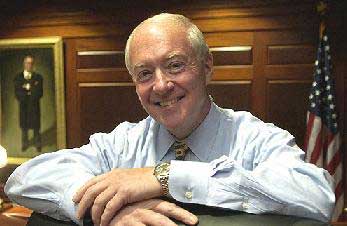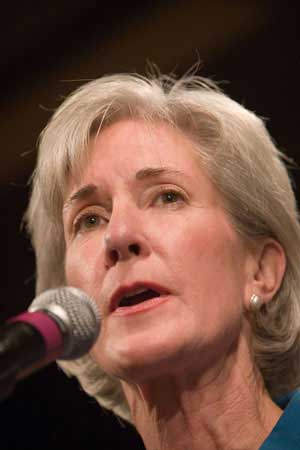BY LINDA BENTLEY | DECEMBER 15, 2010
Federal judge rules major provision of Obamacare unconstitutional
“Congress can tax under its taxing power that which it can't regulate, but it can't regulate through taxation that which it cannot otherwise regulate.”
 RICHMOND, Va. – On Dec. 13, U.S. District Court Judge Henry E. Hudson, for the Eastern District of Virginia, ruled a major component of the Patient Protection and Affordable Care Act, commonly known as Obamacare, unconstitutional.
RICHMOND, Va. – On Dec. 13, U.S. District Court Judge Henry E. Hudson, for the Eastern District of Virginia, ruled a major component of the Patient Protection and Affordable Care Act, commonly known as Obamacare, unconstitutional.
At issue was Section 1501 of the Act, known as the Minimal Essential Coverage Provision (MEC), requiring every U.S. citizen, except those specifically excluded, to maintain a minimum level of health insurance coverage for each month beginning in 2014.
Failure to comply will result in a penalty enforced under the Internal Revenue Code.
The Commonwealth of Virginia, plaintiff in the case, argued the MEC is in direct conflict with the Virginia Health Care Freedom Act.
Hudson, a George W. Bush appointee, stated, “The present procedural posture of this case is best summarized by the penultimate paragraph of this court’s memorandum opinion denying the defendant’s motion to dismiss:
“While this case raises a host of complex constitutional issues, all seem to distill to the single question of whether or not Congress has the power to regulate-and tax-a citizen's decision not to participate in interstate commerce. Neither the U.S. Supreme Court nor any circuit court of appeals has squarely addressed this issue. No reported case from any federal appellate court has extended the Commerce Clause or Tax Clause to include the regulation of a person's decision not to purchase a product, notwithstanding its effect on interstate commerce.”
The Commonwealth’s challenge argued the MEC and affiliated penalty are beyond the outer limits of the Commerce Clause and associated Necessary and Proper Clause, as measured by U.S. Supreme Court precedent.
In other words, the Commonwealth asserted, “requiring an otherwise unwilling individual to purchase a good or service from a private vendor is beyond the boundaries of congressional Commerce Clause power.”
Failure or refusal of its citizens to elect to purchase health insurance “is not economic activity historically subject to federal regulation under the Commerce Clause,” argued the Commonwealth.
The Commonwealth also maintained the MEC is mischaracterized as a tax when it is, in actuality, a penalty untethered to an enumerated power.
 Health Secretary Kathleen Sebelius argued because the insurance industry failed to take corrective action to eliminate the barriers preventing Americans from obtaining affordable insurance, Congress adopted a carefully crafted scheme which bars insurers from denying coverage to those with preexisting conditions and charging discriminatory premiums on the basis of medical history.
Health Secretary Kathleen Sebelius argued because the insurance industry failed to take corrective action to eliminate the barriers preventing Americans from obtaining affordable insurance, Congress adopted a carefully crafted scheme which bars insurers from denying coverage to those with preexisting conditions and charging discriminatory premiums on the basis of medical history.
And, in order to guarantee the success of the reforms, Sebelius maintains that Congress properly exercised its powers under the Commerce Clause or alternatively the Necessary and Proper Clause, to adopt a regulatory mechanism to effectuate these health care market reform measures, specifically, the MEC .
Sebelius claims, because the Act regulates health care financing, it is quintessential economic activity.
She also dismissed the notion that uninsured people can sit passively on the market sidelines, arguing that every individual at some point in life will need some form of health care services, and stated, “No person can guarantee that he will divorce himself entirely from the market for health care services … No person can guarantee that he will never incur a sudden, unanticipated need for expensive care; and very few persons, absent insurance, can guarantee that they will not shift the cost of that care to the rest of society.”
Hudson pointed out Sebelius’ defense of the MEC as a valid exercise of Congress’ independent authority to lay taxes and make expenditures for the general welfare is contrary to earlier representations by the legislative and executive branches, whereas she was now stating “unequivocally that the provision is a tax, published in the Internal Revenue Code, and enforced by the Internal Revenue Service.”
Sebelius took issue with the Commonwealth’s position that there is a legal distinction between penalties that serve regulatory purposes and other forms of revenue raising taxation.
She also asserted, in order for Virginia’s facial challenge to succeed, the “court would have to conclude that no uninsured individual would ever use or be charged for medical services, and that no uninsured individual would ever make an active decision whether to purchase insurance.”
Hudson stated, “Importantly, it is not the effect on individuals that is presently at issue – it is the authority of Congress to compel anyone to purchase health insurance. An enactment that exceeds the power of Congress to adopt adversely affects everyone in every application. Indeed, the Minimum Essential Coverage Provision touches every American citizen required to file an annual IRS Form 1040 or 1040A.”
Turning to the merits, Hudson stated, as his court had previously noted, the MEC “appears to forge new ground and extends the Commerce Clause powers beyond its current high water mark.”
Sebelius’ arguments are all hinged on the notion an individual’s decision not to purchase health insurance is in effect economic activity, rejecting the Commonwealth’s implied premise a person can simply elect to avoid participation in the health care market.
Hudson wrote, “It is inevitable, in her view, every individual – today or in the future – healthy or otherwise – will require medical care. She adds that a large segment of the population is uninsured and ‘consume[s] tens of billions of dollars in uncompensated care each year.’"
According to Sebelius, “The conduct of the uninsured – their economic decision as to how to finance their health care needs, their actual use of the health care system, their migration in and out of coverage, and their shifting of costs on to the rest of the system when they cannot pay – plainly is economic activity."
Hudson stated, “Despite the laudable intentions of Congress in enacting a comprehensive and transformative health care regime, the legislative process must still operate within constitutional bounds. Salutatory goals and creative drafting have never been sufficient to offset an absence of enumerated powers.”
In order to survive a constitutional challenge, Hudson stated the subject matter first must be economic in nature and affect interstate commerce, and second, it must involve activity.
He wrote, “The constitutional viability of the MEC in this case turns on whether or not a person’s decision to refuse to purchase health care insurance is such an activity.”
The Commonwealth contends the federal government is seeking to smuggle an unconstitutional exercise of the Commerce Clause past judicial review in the guise of a tax and in the Commonwealth's view, that legislative tactic “offends the letter and spirit of the Constitution.”
Citing Bailey v. Drexel Furniture Co., the Commonwealth stated, “[T]he law is that Congress can tax under its taxing power that which it can't regulate, but it can't regulate through taxation that which it cannot otherwise regulate.”
After careful review, Hudson concluded “Section 1501 of the Patient Protection and Affordable Care Act – specifically the Minimum Essential Coverage Provision – exceeds the constitutional boundaries of congressional power.”
Hudson viewed his award of declaratory judgment “sufficient to stay the hand of the executive branch pending appellate review,” and in so doing found no need to grant the Commonwealth’s request for injunctive relief.


